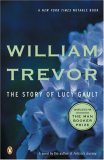Summary | Excerpt | Reading Guide | Reviews | Readalikes | Genres & Themes | Author Bio

All this - the house and the remnants of the pasture land, the seashore below the pale clay cliffs, the walk along it to the fishing village of Kilauran, the avenue over which the high branches of the chestnut trees now met - was as much part of Everard Gault as the features of his face were, the family traits that quite resembled a few of those in the drawing-room portrait, the smooth dark hair. Tall and straight-backed, a man who hid nothing of himself, slight in his ambitions now, he had long ago accepted that his destiny was to keep in good heart what had been his inheritance, to attract bees to his hives, to root up his failing apple trees and replace them. He swept the chimneys of his house himself, could repoint its mortar and replace its window glass. Creeping about on its roof, he repaired in the lead the small perforations that occurred from time to time, the Seccotine he squeezed into them effective for a while.
In many of these tasks he was assisted by Henry, a slow-moving, heavily made man who rarely, in daytime, removed the hat from his head. Years ago Henry had married into the gate-lodge, of which he and Bridget were now the sole occupants, since no children had been born to them and Bridget's parents were no longer alive. Her father, with two men under him, had looked after the horses and seen to all that Henry on his own now saw to in the yard and the fields. Her mother had worked in the house, her grandmother before that. Bridget was as thickset as her husband, with strong wide shoulders and a capable manner: the kitchen was wholly in her charge. The bedroom maid, Kitty Teresa, assisted Heloise Gault in what had once been the duties of several indoor servants; old Hannah walked over from Kilauran once a week to wash the clothes and sheets and tablecloths, and to scrub the tiles of the hall and the stone floors at the back. The style of the past was no longer possible at Lahardane. The long avenue passed through the land that had become the O'Reillys' at the card table, when the Gaults of that time had been left with pasture enough only to support a modest herd of Friesians.
Three days after the shooting in the night Heloise Gault read the letter that had come from Father Morrissey, then turned it over and read it again. She was a slender, slightly built woman in her late thirties, her long fair hair arranged in a style that complemented her features, imbuing a demure beauty with a hint of severity that was constantly contradicted by her smile. But her smile had not been much in evidence since the night she had been woken by a shot.
Even though in the ordinary run of things she was not pusillanimous, Heloise Gault felt frightened. She, too, came of an army family and had taken it in her stride when, a few years before her marriage, she was left almost alone in the world on the death of her mother, who had been widowed during the war with the Boers. Courage came naturally to her in times of upheaval or grief, but was not as generously there as she imagined it would be when she reflected upon the attempt to burn down the house she and her child and her maid had been asleep in. There'd been, as well, the poisoning of the dogs and the unanswered message to the young man's family, the blood on the pebbles. 'I'm frightened, Everard,' she confessed at last, no longer keeping her feelings private.
They knew each other well, the Captain and his wife. They had in common a certain way of life, an order of priorities and concerns. Their shared experience of death when they were young had drawn them close and in their marriage had made precious for them the sense of family that the birth of a child allowed. Heloise had once assumed that other children would be born to her, and still had not abandoned hope that one more at least might be. But in the meanwhile she was so convincingly persuaded by her husband that the lack of a son to inherit Lahardane was not a failure on her part that she experienced - and more and more as her only child grew up - gratitude for the solitary birth and for a trinity sustained by affection.
Reprinted from The Story of Lucy Gault by William Trevor by permission of Viking, a member of Penguin Putnam Inc. Copyright © 2002, William Trevor. All rights reserved. This excerpt, or any parts thereof, may not be reproduced in any form without permission.
Harvard is the storehouse of knowledge because the freshmen bring so much in and the graduates take so little out.
Click Here to find out who said this, as well as discovering other famous literary quotes!
Your guide toexceptional books
BookBrowse seeks out and recommends the best in contemporary fiction and nonfiction—books that not only engage and entertain but also deepen our understanding of ourselves and the world around us.